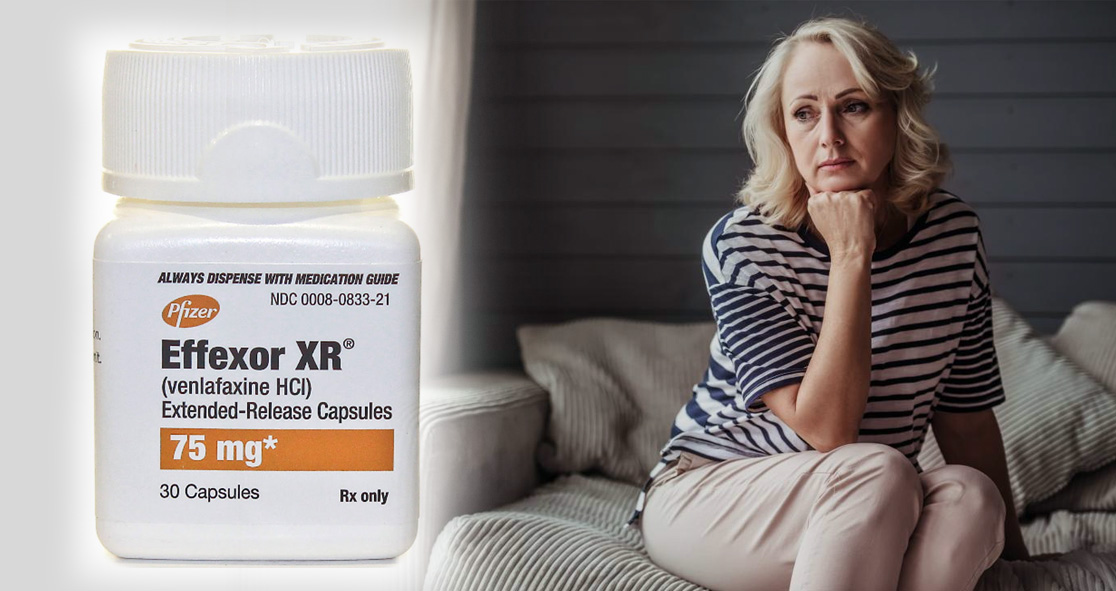Venlafaxine (Effexor) is recommended for the treatment of major depressive disorder, generalized anxiety disorder (GAD), panic disorder, and social anxiety disorder.
It is used off-label to treat migraine headaches, diabetic neuropathy, and hot flashes.
Drug Class and Mechanism of Action
Venlafaxine belongs to the class of drugs known as Serotonin-Norepinephrine Reuptake Inhibitors (SNRIs). The exact mechanism of action is unknown but is presumed to work by helping to restore the balance of brain chemicals, or neurotransmitters, such as serotonin and norepinephrine. The drug may help in improving your mood and energy level, restoring your interest in daily living.
The working of venlafaxine as an antidepressant in humans is believed to be associated with its potentiation of neurotransmitter activity in the brain, according to Rx List. Animal studies have shown that the drug is a potent inhibitor of neuronal serotonin and norepinephrine reuptake.
Dosage
The recommended dose of venlafaxine is 75 mg per day, advised in two or three divided doses, which is to be taken orally with food. The dose may be increased up to 150 mg per day depending on tolerability and the need for the further clinical effect, according to Rx List. Special precautions are taken when prescribing the dose of venlafaxine in patients with liver cirrhosis.
Venlafaxine dosage is based on your medical condition and response to the drug. So, your physician may advise you to start the drug at lower potencies initially and then gradually increase your dose. Make sure you follow your doctor’s instructions carefully. More importantly, take this depression medicine regularly to get the most benefit from it.
Side Effects
Venlafaxine may cause nausea, dizziness or dowdiness, dry mouth, constipation, reduced appetite, blurry vision, nervousness, sleeping issues, or unusual sweating. If any of these side effects persist or aggravate, immediately seek medical attention. Most people who use this antidepressant medication do not experience serious side effects, according to WebMD.
The drug may increase your blood pressure levels so monitor your blood pressure regularly and inform your doctor if the levels are high. Visit your doctor right away if you experience any mental or mood changes, suicidal thoughts, easy bruising/bleeding, decreased interest in sex, or tremors.
Precautions
Before your doctor prescribes venlafaxine, you should tell if you are allergic to any drugs or have any medical history, especially bleeding problems, high blood pressure, heart disease, high cholesterol, kidney or liver disease, seizure disorder, or thyroid disease. Also, inform your doctor that you take medications for your health issues to prevent any drug interactions.
Venlafaxine may make you a bit drowsy or affect your vision. Therefore, it is advised to avoid alcohol, driving, using machinery, or doing anything that needs your mental alertness. Older people may be more sensitive to the side effects of venlafaxine; they may feel dizzy when standing. Check with your doctor whether you can take this medicine during pregnancy or breastfeeding.
Generic and Brand Name
The brand name of venlafaxine is Effexor. Pfizer manufactures this antidepressant drug. The Food and Drug Administration (FDA) approved venlafaxine for depression, anxiety, and panic disorders in December 1993. However, since the patent has expired, the drug is available as generic venlafaxine.
Alembic Pharmaceuticals, Amneal Pharmaceuticals, Aurobindo Pharma, Cadila Pharmaceuticals, Dr. Reddy’s Laboratories, Heritage Pharmaceuticals, Sun Pharms, Teva, YaoPharma, and Zydus Pharmaceuticals market and sell generic venlafaxine in different potencies. The lowest price for the most common generic version of venlafaxine 75 mg is around $3.00, more than 90% cheaper than the branded version that costs $36.14.





















